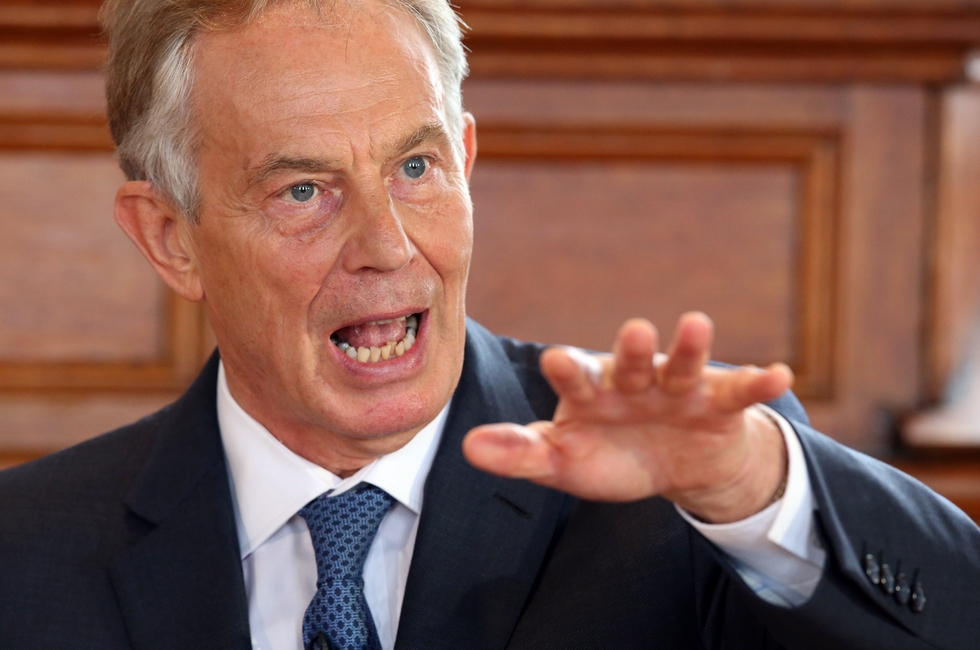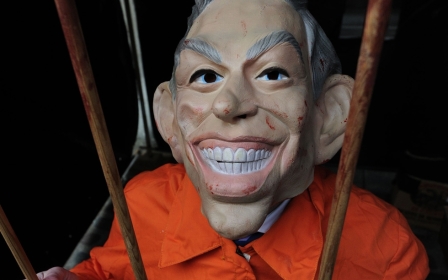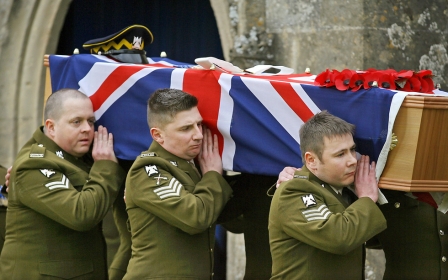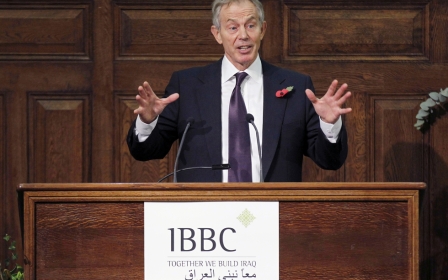How Blair sought to avoid responsibility at Chilcot

The Guardian suggested on 6 June 2016 that, in the wake of the publication of the Chilcot report, Tony Blair “will argue that the ultimate cause of the long-term bloodshed in Iraq was the scale of external intervention in the country by Iran and al-Qaida”.
There is a slight problem with such an attempt to evade responsibility for the post-invasion bloodshed in Iraq: it fails to take account of the fact that without the prior external intervention by the US and UK in March 2003, which led to the overthrow of Saddam Hussein, external intervention by Iran and al-Qaida would not have occurred. Saddam Hussein would have ensured that it didn’t happen.
Tony Blair warned in advance
It is not as if Tony Blair wasn’t warned in advance of the possibility of post-war chaos and sectarianism in Iraq. In November 2002, three Iraq experts – Professor George Joffe, Dr Toby Dodge and Dr Charles Tripp – were invited into Downing Street to brief Blair on the potential fallout from an Anglo-American attack on Baghdad.
In an account given in June 2014 Professor Joffe said: "We were not allowed to talk about whether or not it was a good idea to invade, but only about what the aftermath would be. … It was clear that the decision had already been made ... to invade Iraq.”
According to Joffe, Tony Blair wasn’t interested in listening. In response to warnings that the country could descend into civil war and a Sunni-led insurgency, Blair merely responded, in reference to Saddam Hussein, “But the man’s evil, isn’t he?”
Joffe says he told Tony Blair in Downing Street in 2002 that if he was going to invade Iraq he “had to be aware that you might remove Saddam but you left behind a whole structure of power.. of people who would resent being displaced, disadvantaged and would react.”
Blair, he recalled, “was completely uninterested in any of these complexities... he said virtually nothing for an hour and a half [and] we had the sense we were talking to a stone wall.”
Occupying powers responsible for protecting civilians
Tony Blair has continually refused to accept that the horrendous bloodshed in Iraq since 2003 was a consequence of the invasion and wouldn’t have happened without it. For example, on 4 July 2006 when asked by Conservative MP Edward Leigh: ““Do you accept that tens of thousands of Iraqis are now dead as a result of this invasion?”
He replied: “Well, hang on a minute, they are not dead as a result of the invasion or the removal of Saddam. They are dead as the result of the activities of a criminal minority who want to stop the majority getting the democracy they want.”
That is an extraordinary attempt to evade responsibility for the post-invasion deaths in Iraq.
What is more, under the Fourth Geneva Convention (on the protection of civilian persons in time of war), by occupying Iraq, George Bush and Tony Blair assumed a duty of care for every Iraqi civilian. Article 27 of the convention says: “Protected persons … shall at all times be humanely treated, and shall be protected especially against all acts of violence or threats thereof and against insults and public curiosity.”
Civilians living under foreign occupation are “protected persons” under Article Four of the convention.
So, Tony Blair cannot evade responsibility for civilian deaths by saying “we didn’t kill all those Iraqi civilians, it was a criminal minority that did it”. By occupying Iraq, Bush and Blair took on the responsibility for protecting civilians against “all acts of violence or threats thereof” from whatever source. They signally failed to do so.
Saddam Hussein '20 times as bad as Bashar al-Assad'
BBC Newsnight broadcast a special programme on 26 February 2013 for the 10th anniversary of the invasion. This included an interview with Tony Blair by Kirsty Wark, during which he actually argued that the death toll in Iraq would have been much worse if Saddam Hussein had been left in power.
In attempting to make a case for this, he “pointed to the numbers of people who had suffered under Saddam Hussein and the significant numbers killed under his regime in Kurdish areas and during the Iran-Iraq war”, never mentioning the fact that Saddam had the support of the West in his aggression against Iran and gave silent approval to his use of chemical weapons both on the battlefield and against Iranian civilians.
The objective of this was to establish that Saddam Hussein was an extremely bad man, who confronted with a popular uprising would slaughter many, many more of his own people than Syrian President Bashar al-Assad:
This is a bizarre ex post facto argument for the invasion: according to Blair, the invasion was justified not because of Saddam’s refusal to give up his “weapons of mass destruction” in accordance with Security Council resolutions, nor because of his brutal behaviour towards his own people a decade or more earlier, but because of his inevitably brutal suppression of an inevitable future insurgency against him prompted by the Arab Spring.
Could Tony Blair have been more wrong?
The situation in Iraq in March 2003, which was disrupted by the invasion, was relatively benign. Then, according to its annual reports on Iraq, Amnesty International estimated that “scores of people, including possible prisoners of conscience, were executed” in 2002, a similar number in 2001 and “hundreds” in 2000 – and Amnesty International was no friend of Saddam Hussein.
In March 2015, Physicians for Social Responsibility published a review of the various estimates of post-invasion civilian deaths in Iraq. They concluded that “the war has, directly or indirectly, killed around 1 million people in Iraq” (p15) from March 2003 until US troop withdrawal at the end of 2011.
Before the invasion, Tony Blair predicted that the innocent lives saved as a result of unseating Saddam Hussein would more than compensate for the civilian lives lost during the military action to unseat him. This was the message he gave the House of Commons on the eve of the invasion:
“Of course, I understand that, if there is conflict, there will be civilian casualties. That, I am afraid, is in the nature of any conflict, but we will do our best to minimise them. However, I point out to my hon. Friend that civilian casualties in Iraq are occurring every day as a result of the rule of Saddam Hussein. He will be responsible for many, many more deaths even in one year than we will be in any conflict.”
The message is clear: left alone, Saddam Hussein would kill more innocent Iraqis in a year than will be killed in the upcoming conflict and, ultimately, more lives will be saved by taking military action to unseat him.
Could Tony Blair have been more wrong?
- David Morrison is the co-author of A Dangerous Delusion: Why the West is Wrong about Nuclear Iran (published by Elliott & Thompson, 2013). Morrison has written many articles on the US-led invasion of Iraq.
The views expressed in this article belong to the author and do not necessarily reflect the editorial policy of Middle East Eye.
Photo: Britain's Labour former Prime Minister Tony Blair gestures as he speaks at the University of Ulster in Derry (Londonderry), Northern Ireland on 9 June, 2016 (AFP).
New MEE newsletter: Jerusalem Dispatch
Sign up to get the latest insights and analysis on Israel-Palestine, alongside Turkey Unpacked and other MEE newsletters
Middle East Eye delivers independent and unrivalled coverage and analysis of the Middle East, North Africa and beyond. To learn more about republishing this content and the associated fees, please fill out this form. More about MEE can be found here.





